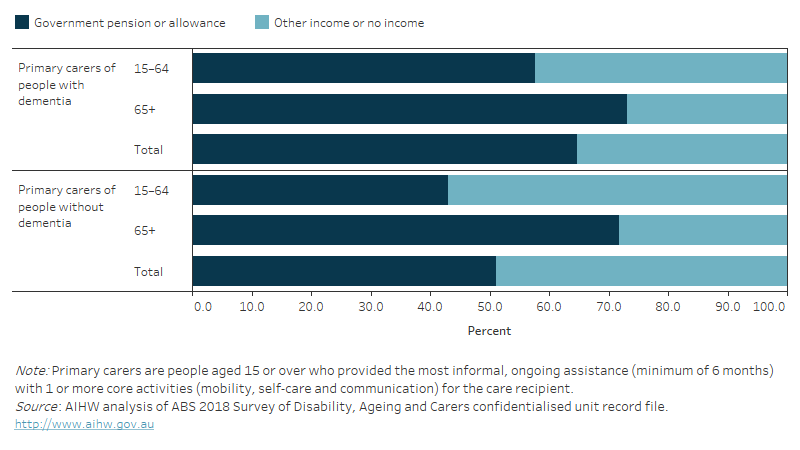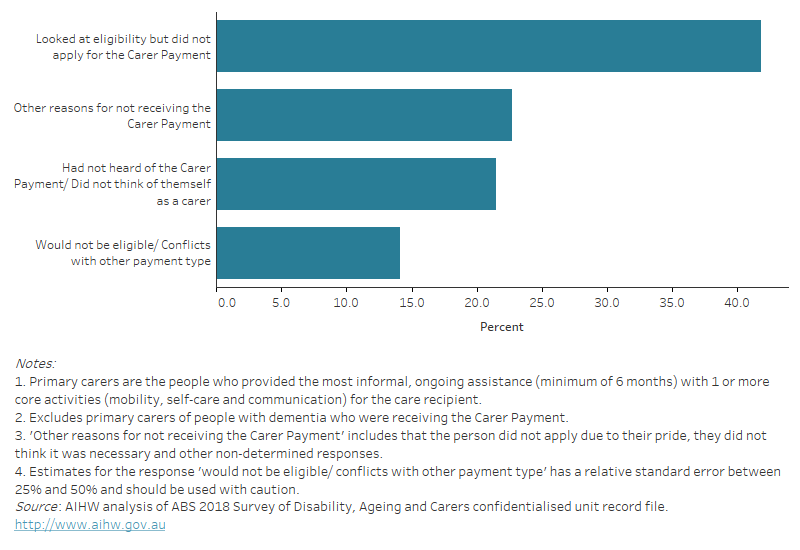Employment and financial impact on carers
For primary carers who were/are in paid employment, the demands of caring for a person with dementia may affect their work commitments and arrangements. Changes in employment may then also have an impact on their financial situation. This pages focuses on the employment status and financial impact of the caring role on primary carers of working-age (aged 15 to 64) in 2018, from the Australian Bureau of Statistics Survey of Disability, Ageing and Carers (SDAC).
Around 53% of primary carers of people with dementia (and 71% of primary carers of people without dementia) were of working-age in 2018 (Table S6.20). Primary carers of people with dementia were more likely to be unemployed or not in the labour force (75%) than primary carers of people without dementia (59%).
Among working-age primary carers of people with dementia:
- 80% of carers who were currently unemployed or not in labour force did not want to be employed now that they were in the caring role – this was slightly higher than for primary carers of people without dementia (74%).
- 33% of carers who were employed had to reduce their weekly work hours – this was similar among primary carers of people without dementia (37%).
- 52% experienced a financial impact since taking on the caring role.
- 24% had a decrease in income – this was similar among primary carers of people without dementia (27%).
- 28% had extra expenses – this was also similar among primary carers of people without dementia (28%).
- 34% reported that their income was not affected by taking on the caring role – this was similar among primary carers of people without dementia (31%) (Table S6.14).
Main source of income
Primary carers of people with dementia were more likely to rely on government benefits as their main source of income (65%) than primary carers of people without dementia (51%) (Figure 6.8). See Box 6.2 for more information on government benefits available to eligible informal carers.
This difference was more substantial among primary carers of working age – 58% of primary carers of people with dementia relied on government benefits as their main source of income, compared with 43% of primary carers of people without dementia. There was less difference in the main source of income among primary carers aged 65 and over, likely due to the availability of the Age Pension to Australians aged 65 and over.
Figure 6.8: Primary carers of people with dementia and people without dementia in 2018: percentage by main source of income and carer age group
Figure 6.8 is a bar graph showing the percentage of primary carers of people with dementia and primary carers of people without dementia in 2018 by the main source of income and carers age. Primary carers of people with dementia were more likely to rely on government benefits as their main source of income than primary carers of people without dementia. This difference was more substantial among primary carers of working age (15 to 64 years). Among primary carers aged 65 and over, the main source of income was fairly similar for those who care for people with dementia and those who care for people without dementia.

Box 6.2: Australian Government benefits available to eligible informal carers
There are a number of government benefits available to eligible Australian residents who provide informal care, where the demands of caring severely restrict or prevent the carer from undertaking substantial paid employment:
- Carer Payment is a means-tested income support payment available to informal carers who provide constant care to someone who has a severe disability or medical condition, or an older, frail person.
- Carer Allowance is an additional fortnightly payment for people who provide daily care to someone who has either a disability or serious illness, or an older, frail person. It can be paid in addition to wages, or another income support payment.
- Carer Supplement is an annual automatic payment to recipients of Carer Allowance and Carer Payment, to help cover costs when caring for someone with a disability.
For carers of adult care recipients (aged 16 and over) a medical report completed by a health professional currently treating the person is required to assess eligibility for the Carer Payment and the Carer Allowance. This report is based on the Adult Disability Assessment Tool, designed to measure the level of care required, irrespective of the condition causing the disability. Information is collected on the amount of help required to undertake activities of daily living (such as mobility, communication, hygiene, eating) as well as a range of cognitive and behavioural areas (Services Australia 2023).
Carer payments
According to the SDAC, almost 1 in 3 primary carers of people with dementia (31%) received the Carer Payment in 2018 (Table S6.16).
Among primary carers of people with dementia who were not receiving the Carer Payment, 42% looked into eligibility but did not receive the payment (Figure 6.9). A further 22% either had not heard of the Carer Payment or did not consider themselves as a carer to apply for this payment, and 14% had looked into receiving this but they were not eligible.
Figure 6.9: Primary carers of people with dementia who did not receive the Carer payment in 2018: percentage by reasons why carers were not receiving the Carer Payment
Figure 6.9 is a bar graph showing the percentage of primary carers of people with dementia who were not receiving the Carer Payment in 2018 by the main reasons why they were not receiving the Carer Payment. Over two-fifths of primary carers of people with dementia who were not receiving the Carer Payment looked into eligibility for the payment but did not apply for it. Just over one-fifth had not heard of the Carer Payment or did not consider themselves as a carer.

Services Australia (2023) Payment you can get as a carer, Services Australia, Australian Government, accessed 10 July 2023.


